Devotionals from Around the World
NATION Every







RICK POSTMA, DIRECTOR OF PUBLIC RELATIONS FOR WORD & DEED MINISTRIES

At our monthly team meetings, we have a segment with the title, “New Ideas.” During that time, everyone is free to share ideas related to our work—no criticisms allowed. They all go on a list and then we discuss them briefly. Most don’t see the light of day. But then some do. One idea that survived the winnowing process was to publish a booklet of devotionals written by many of our partners. The end product was the magazine you have in your hands.
“As I read through the devotionals, I realized that the work of God’s hands by His Spirit, and through His people, is coming to fruition before our very eyes: “Let the peoples praise You, O God; let all the peoples praise You. Then the earth shall yield her increase; God, our own God, shall bless us” (Psalm 67:5–6). God is fulfilling His promise that His people shall be gathered from every tribe and nation - what a privilege to worship the King of Kings together!
“In each devotional, you will read about the trials His people are suffering—hunger, persecution and disasters. God has not promised His people an easy time. What He does promise is that no one and “no thing” can separate us from Him, our God and Redeemer: “Who shall separate us from the love of Christ? Shall tribulation, or distress, or persecution, or famine, or nakedness, or peril, or sword? As it is written: ‘For Your sake we are killed all day long; we are accounted as sheep for the slaughter’” (Romans 8:35–36).
As I read them, I also felt humility. These are God’s people on the front lines reporting to us about their joys and sorrows. They face many more challenges than most of us do. What a privilege to walk beside them, prayerfully, thoughtfully, and by God’s grace, faithfully.
One suggestion we at Word & Deed have for you is that you take this issue with you on vacation and read it together as a family. Then pray for your brothers and sisters in each country represented here and, as you do, pray as well that the Lord Jesus, as He promises in Revelation 22:20, will come quickly: “Amen. Even so, come, Lord Jesus!” W&D
Shelly Crites, Hanna Korvemaker, Susan Trentacosti
Word & Deed North America is an evangelical and Reformed humanitarian relief and development organization. Our aim is to help meet the physical and spiritual needs of people in the developing world in accordance with biblical principles for the glory of God.
Executive Team
John Otten, Rick Postma, Heidi Pronk
Staff
Scott Dekorte, Scott Koopman, Kara Luiting, Dave Vander Meer, Kasper Van Veen, Nikki Veurink, Laurenne Wattel
Canadian Board of Directors
Chairman - John Jagersma
Vice-Chairman - Corney Les
Secretary - Dave Wielinga
Treasurer - Clarence Jonker Wilf Bout, Bert Mulder, James Neven, Paul Wagenaar, Lyle Ypma
USA Board of Directors
President – Paul Beezhold
Vice President – Jay Van Voorst
Secretary – Harry Kooistra
Treasurer – Karen Vander Sloot
Eric Brandt, Martin Faasse, Eric Greendyk, Paul Laman, Pete Vander Stel
Advisory Committee
Mr. Jim Beeke –
International Educational Consultant
Dr. Gerald M. Bilkes – Professor of Old & New Testament, Puritan Reformed Theological Seminary
Pastor Richard Bout –URCNA Missions Coordinator Dr. Arjan de Visser –Emeritus Professor of Ministry and Mission, Canadian Reformed Theological Seminary
Rev. William Godfrey –Senior Pastor of Christ United Reformed Church in Santee, CA
Pastor Danny Hyde – Pastor, Oceanside United Reformed Church
Pastor Mark Vander Hart –Emeritus Professor at Mid-America Reformed Seminary
Pastor Frank Van Dalen –Former Executive Director of the Foreign Missions Board of the ARP. Canada Office PO Box 20100 St. Thomas, ON N5P 4H4 Toll free 877.375.9673
office@wordanddeed.org
United States Office PO Box 157, Hudsonville, MI 49426
Toll free 866.391.5728
usoffice@wordanddeed.org
Registered Charity Number (Canada) 89 120 0941 RR0001
EIN Non-profit Number (USA) 37-1429283
Bible quotations are from the NKJV unless otherwise noted.
THE CONTENT OF THIS PAGE WAS INTENTIONALLY DELETED
THE CONTENT OF THIS PAGE WAS INTENTIONALLY DELETED

JUAN CARLOS RAMIREZ, DIRECTOR OF EDUCATION PLUS
Cultural Context: The shantytowns where Education Plus works are very different from the rest of the country. They are noisy with children running and playing on the paths and people mingling in the alleys day and night. The shantytown people move at a different speed than the rest of us, with their own culture and schedule. One night last month I arrived at the Alajuelita shantytown for a Bible study to find the alleys deserted and silent. I soon found out that there had been three gang murders the night before; one of the victims, Carlo, was a young friend of mine who used to attend our youth meetings, but he had chosen the “wide road.” Since then, the situation has worsened in Alajuelita and in the rest of the country. Deaths related to gang wars, early morning shootings, and heavily armed police have become part of the landscape.
But when He saw the multitudes, He was moved with compassion for them, because they were weary and scattered, like sheep having no shepherd. Then He said to His disciples, ‘The harvest truly is plentiful, but the laborers are few. Therefore, pray the Lord of the harvest to send out laborers into His harvest’ (Matthew 9:36–38).
This difficult environment has made me reflect on how we, as Christians, should react. Are we emboldened or are we fearful? Even today I continue to meditate on this. After reading the above passage from Matthew 9 one evening, I understood the meaning of those words in a new way. I saw it reflected in the faces of the people we minister to; they were weary and defenseless. The situation is very overwhelming for these families, knowing that at any moment they could die due to a stray bullet or other gang-related activity. Fear has taken over the people. It is our responsibility as Christians to tell them about the true comfort and peace that we can only find in God. Each and every one of us will have to appear before the judgment seat of Christ. Sadly, many, like my friend Carlo who died in the shantytown that night, do so deprived of Christ. The night after the shooting, during the Bible study, we reviewed the Gospel message and our need for a Savior. I was able to share the biblical concept of Christ as the Good Shepherd, being moved to compassion for the people because they were as sheep without a shepherd. So, where and when should I be compassionate? The answer is simple: everywhere and at all times. Matthew’s text ends by saying that the harvest is plentiful but the laborers are few, and for this reason Jesus invites us to ask the Lord of the harvest to send out laborers. Not everyone has been called to spread the news of the Gospel in the shantytowns of San Jose, Costa Rica—but I have. You have also received the calling to spread the good news. Some of us God sends to specific places, but others are called to spread the Gospel in their own homes, at their workplace, or in their schools and churches. We are Gospel workers wherever God has placed us. May the Lord give us strength to live out this calling. Amen. W&D
“
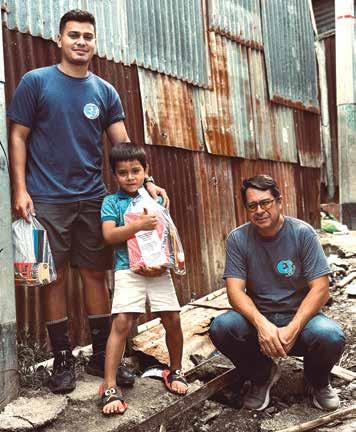
1. Pray that God will strengthen us all, every day, enabling us to effectively share the Gospel.
2. Pray for safety and peace in the shantytowns of San Jose, Costa Rica.
3. Pray that God will provide the Education Plus team with all that is necessary to continue working in broken places, eager to share the urgent message of the Gospel.
THE CONTENT OF THIS PAGE WAS INTENTIONALLY DELETED

FANNY MARTINEZ, BOARD SECRETARY OF SAN LUCAS SOCIETY
Cultural Context: The Dominican Republic is known for its natural beauty and warm people. However, in the bateyes—sugarcane villages where many families live—life is marked by hardship. Behind the tourist attractions, many children grow up without access to quality education and proper healthcare. Their parents work long hours for a very meager income and struggle to provide even basic needs for their children. Yet, amidst these challenges, the church is alive and God is at work. The faith and joy of believers in these communities is surprising. It is not based on material comfort, but on the daily experience of God’s presence.
But I have trusted in Your mercy; my heart shall rejoice in Your salvation. I will sing to the Lord, because He has dealt bountifully with me (Psalm 13:5–6).
In our ministry, we often witness how hardship sharpens faith. Many families in the bateyes have little to be happy about, yet their joy is genuine. I remember as a child, going to the bateyes to bring food and to help with medical clinics. It amazed me to see how, despite all their needs and illnesses, the people living in these areas had the most radiant smiles and a stronger faith than I had ever seen. They were happy and taught us songs in Creole and showed us their dances. I was struck by the fact that there was so much joy in a place where you would think there is none. That memory still echoes in my heart. This should remind us that in a world where needs often feel overwhelming, God is there. He sees the child who walks barefoot to school, the elderly woman praying alone
in her small wooden house, and the young man longing for purpose. He is present, and He alone is the source of our joy. Working among these communities has taught me to rely on God more deeply and to find joy in knowing Him. His faithfulness is not just a theory; it is something we experience. When there are no resources, He provides. When we are weary, He strengthens. Every Bible study under a mango tree, every prayer whispered in tears, and every act of kindness is proof that the steadfast love of the Lord never ceases. The struggles are real, but so is the faithfulness of God. He is present, working, and sustaining His people—not just in the Dominican Republic, but everywhere. We can trust in Him, and He is the source of true joy. W&D

1. Pray for the communities in the bateyes to continue experiencing God’s joy, faithfulness, and provision.
2. Pray for the children and youth, that they may grow up knowing the hope and truth of Christ, the ultimate source of joy.
3. Pray for joy, strength, and wisdom for those serving, that they may not grow weary but continue to trust in the Lord.

CARLOS COFFIN, EXECUTIVE DIRECTOR FOR PALABRA Y HECHO DE NICARAGUA
Cultural Context: The Miskitu people are an indigenous group living on the northern Caribbean coast of Nicaragua, known for their simple lifestyle, engaged in subsistence farming, artisanal fishing, and trade. Although they are now an ethnic group reached by the Gospel, with their entire Bible translated into the Miskitu language, there is nevertheless a strong syncretism mixed with animistic indigenous traditions that affects the worldview of believers. This reflects the need for discipleship grounded in the truth of the Gospel. The positive aspect is that there is freedom to preach, and the community members have a strong thirst to know more about God.
And you shall know the truth, and the truth shall make you free (John 8:32).
Freedom! This is the longing of the slave, the imprisoned, and the oppressed, but this longing is only present in those who are aware that they are not free. So, there is something far worse: to be enslaved without being aware of it. This was what happened to the Pharisees whom Christ confronted, according to our key text. They responded, “We are Abraham’s descendants, and have never been in bondage to anyone. How can you say, ‘You will be made free?’” (John 8:33). These Jews were so attached to their traditions that they ignored the reality of their sins. They lived outside the Scriptures, their tradition being the moral authority for their consciences. Jesus knew their situation of spiritual slavery, and that is why He tells them that until they know the truth, they would not be free. Deception is exposed when it is confronted with the truth. Jesus declared in John 14:6 that He himself was the truth. He is truth incarnate; therefore, He is the only liberator from spiritual slavery.
Through faith in Christ as our Savior, we come to know the truth that has freed us from the power of sin and brought us into the kingdom of God. Furthermore, in our daily walk as Christians, the truth of God’s word constantly purifies us, developing within us a worldview based on biblical truth. The Gospel definitely brings freedom, but we must ask ourselves, “How committed are we to the truth?” In Nicaragua, we have the freedom to preach and the Bible teaches that, as a church, we are mandated to proclaim it to the ends of the earth.
We give glory to God because this glorious Gospel has reached our indigenous communities, and Christianity is the official religion in Nicaragua. People worship God every Sunday; however, we notice that there is still a religious syncretism between truth and lies, which has deprived many believers of enjoying true freedom in Christ. This reminds us of the words of our Lord Jesus, “If you abide in My word, you are my disciples indeed. And you shall know the truth, and the truth shall make you free” (John 8:31–32). Knowing the
truth and remaining in the truth is our fundamental need, and this demands messengers committed to the truth who teach “the whole counsel of God” (Acts 20:27). May God help us! W&D
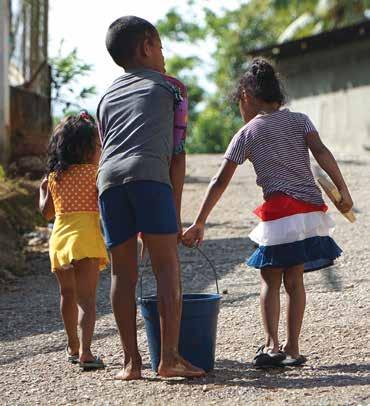
1. Pray that the Word of God will be faithfully proclaimed to the ends of the earth.
2. Pray that God will send more workers to disciple the Miskitu people.
3. Pray for a revival of truth among the Miskitu people and around the world.
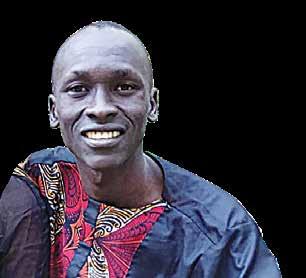
WILLIAM WOL, DIRECTOR OF STREET CHILDREN MINISTRIES
Cultural Context: South Sudan’s cultural context values community, tradition, and resilience. The people grow up surrounded by strong family ties and deep respect for elders, yet are faced with challenges like conflict, displacement, and limited access to education. Growing up in this culture can often lead to people feeling unseen and overwhelmed, but God reminds His people that He has a plan for all of our lives. Even in hardship, the strength of culture can shape us. Through the strength of community and God’s promises, we can learn to endure, grow, and trust His greater purpose.
“ “
Therefore comfort each other and edify one another, just as you also are doing (1 Thessalonians 5:11).
Growing up in the cultural richness of South Sudan has deeply shaped my relationship with the Lord. Our communities are built on strong family ties, respect for elders, and a shared sense of responsibility and values that help us understand God’s nature in a profound way. Just as our people rely on each other for survival, we have learned to rely on God, not just in times of crisis, but in daily life. The communal spirit in our culture reflects the body of Christ, where each person plays a role in building and supporting one another, as declared in our key verse.
Living through hardship, conflict, and displacement is not easy for the people of South Sudan. Many in our communities have known suffering, yet they continue to hold onto hope. In these moments, we experience God’s faithfulness. He has not abandoned us. He provides strength to the weary, peace in times of fear, and unexpected joy in moments of gathering and worship (Isaiah 40:29). Even when resources are scarce, we see generosity among neighbors, and we are reminded of the widow who gave all she had (Mark 12:41–44). This is a beautiful form of worship.
In our oral traditions, stories are passed from one generation to the next. There are many parallels to this and how we share testimonies in church—the stories of healing, provision, and transformation are narratives that anchor our faith and remind us that God is alive and active. His Word comes through Scripture, but it is also alive in the lived experiences of His people. “For the word of God is living and powerful, and sharper than any two-edged sword, piercing even to the division of soul and spirit, and of joints and marrow, and is a discerner of the thoughts and intents of the heart” (Hebrews 4:12).
God reveals Himself to His people in every season that they go through. God is faithful. He walks with us in our journey,
honors our heritage, and calls us to reflect His Word in our communities. “Your mercy, O Lord, is in the heavens; Your faithfulness reaches to the clouds” (Psalm 36:5). W&D
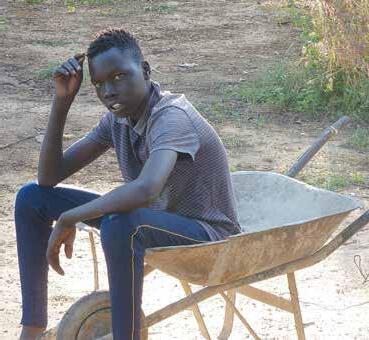
1. Pray that God will reveal Himself to His people, despite cultural struggles and challenges.
2. Pray that the Lord will provide strength and courage to the suffering people of South Sudan.
3. Thank the Lord for the comfort of His Word and for the fellowship and comfort of other believers.

LUCAS FERRO, EXECUTIVE DIRECTOR OF MINISTRY AT AMG GUATEMALA
Cultural Context: Guatemala is a land of breathtaking beauty, yet it faces deep struggles. Nearly 60% of the population lives in poverty and many children suffer from malnutrition. In the midst of Catholicism and syncretistic beliefs (spirit worship), evangelical churches are growing and the name of Christ is being preached. However, many believers face economic hardships that test their faith. Amid these struggles, Christ remains our sustainer. In rural communities families pray for daily bread, not knowing where their next meal will come from—but God, in His faithfulness, provides. The challenges are great, but so is the evidence of God’s mercy and provision in the lives of His people.
“
I have learned in whatever state I am, to be content (Philippians 4:11).
True contentment is not found in circumstances but in Christ alone. The Apostle Paul, writing from prison, declared that he had learned the secret of being content in both abundance and need. This contentment does not come from material security, but from a heart anchored in the sufficiency of Christ.
In Guatemala, where economic struggles are common, this truth is tested daily. It is easy to think that contentment comes when problems are solved, but Scripture teaches us the opposite—contentment is a posture of the heart that trusts in God’s faithfulness regardless of circumstances (1 Timothy 6:6–8, Hebrews 13:5, Matthew 6:25–33, Psalm 37:3–5). The believer who has little but rests in Christ is richer than the one who has much but is consumed by worry.
A dedicated AMG teacher shares how she found true contentment in Christ. Despite facing trials, including a recent throat surgery that was jeopardizing her job as a teacher, she experienced God as her refuge and sustainer. Even in moments of uncertainty, she discovered a deep and unshakable peace—not dependent on circumstances, but anchored in God’s presence. The love and prayers of fellow believers strengthened her faith, leading her to become part of a church family where she now serves. Her story powerfully illustrates that contentment is not the absence of struggles but the assurance of Christ’s presence through them.
This does not mean ignoring real needs or hardships. It means that our hope is not in a change of situation, but in the unchanging promises of God. The same Christ who provided for the five thousand, who sustained Paul in prison,
“
and who clothes the lilies of the field is the same Christ who walks with us today. In both lack and abundance, His grace is sufficient, and His presence is enough. W&D
1. Pray that believers all over the world will find contentment in Christ, trusting His faithfulness in all circumstances.
2. Pray that Word & Deed’s partner, AMG Guatemala, will be recognized not only for providing food and education to those in need but also for their commitment to sharing the Gospel.
3. Pray that believers who have experienced Christ’s presence in hardship will be empowered to share their testimony, encouraging others to find hope in Him.

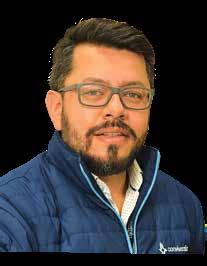
PASTOR CARLOS FIGUEROA, CHAPLAIN OF CONVIVENTIA
Cultural Context: Colombia is a land of striking contrasts, where natural beauty and cultural richness coexist with profound social challenges like violence, poverty, corruption, and displacement. Added to these challenges are religious tensions and an environment that is increasingly drifting away from biblical principles. In the midst of this reality, Christianity brings hope. To be a believer is to go against the tide, with courage and love, proclaiming a message of truth, restoration, and peace. Even though families are struggling and young people are vulnerable, the Gospel brings hope and the church stays strong in its faith.
The voice of one crying in the wilderness: Prepare the way of the LORD; make straight in the desert a highway for our God. Every valley shall be exalted and every mountain and hill brought low; the crooked places shall be made straight and the rough places smooth (Isaiah 40:3–4).
This passage is both an invitation and a mission. Isaiah calls us, first and foremost, to align our hearts and actions with God’s purpose, so that His mercy, grace, and power are poured out into every aspect of our lives. Second, it is a call to proclaim the coming of the Lord. In this time when we have decided to go “against the current,” Isaiah 40 reminds us that God is not distant. He is the Good Shepherd who feeds His flock, gathers the lambs in His arms, and carries them in His bosom (v. 11). He is the Almighty God who measures the waters in the hollow of His hand and measures the heavens with a span (v. 12). His mercy and majesty are unparalleled, and His promises are eternal.
Let us remember that preparing the way for the Lord is not only an exercise in introspection but a transforming action. Let us ask ourselves before God: What valleys in our lives, families, and communities need to be exalted? What mountains of injustice, pride, or fear need to be lowered? What crooked places need to be made straight? God’s power is at work in us, but He also calls us to be active participants in His redemptive mission. He not only summons His people, but He also equips and sustains them to move forward in the way He has already determined. It is a joint work between His sovereign grace and our active obedience.
Isaiah 40 concludes with this promise of renewal: “But those who wait on the Lord shall renew their strength; they shall mount up with wings like eagles, they shall run and not be weary, they shall walk and not faint” (v. 31). Let us dedicate ourselves to preparing the way for the Lord, proclaiming the good news of salvation with courage and compassion, confident that His strength will sustain us, His mercy will lift us up, and His power will carry us forward. W&D
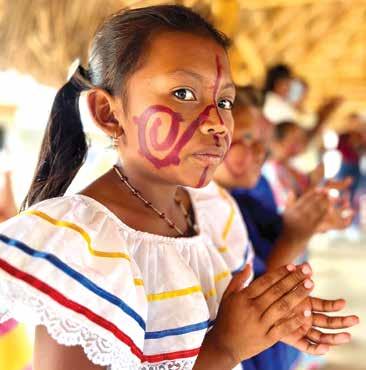
1. Pray that the Lord will show His worldwide church how to be active participants in His redemptive mission.
2. Pray that Christians in Colombia will be given courage to live their lives “against the current,” even when it is very difficult to do so.
3. Thank the Lord for the transforming hope of the Gospel message to those who hear it.
THE CONTENT OF THIS PAGE WAS INTENTIONALLY DELETED
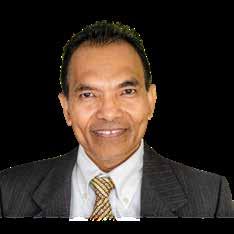
PASTOR YONSON DETHAN, BOARD CHAIRMAN FOR REFORMASI
Cultural Context: Indonesia, a vast archipelago comprising over 17,000 islands, boasts a rich tapestry of cultures and languages. With more than 300 ethnic groups, our country is a melting pot where many religions, such as Islam, Hinduism, Buddhism, and Christianity, coexist. This diversity fosters a vibrant cultural landscape, encompassing traditional dance, art, religious customs, and clothing with different motifs and colors and styles. However, the struggle to preserve indigenous cultures in the face of globalization poses significant concerns. Political instability and issues surrounding religious intolerance are also present on every island and province of Indonesia.
“Behold, the Lord God shall come with a strong hand, And His arm shall rule for Him; Behold, His reward is with Him, And His work before Him (Isaiah 40:10).
In this profound verse from Isaiah, we are beckoned to “behold” the manifestation of God’s greatness and power and might. This world is often marked by the uncertainty of war, conflicts, hunger, epidemics and pandemics. This verse calls to witness the mighty nature of our Lord and is both a comfort and a directive.
God’s might is not merely a concept but it is vividly displayed in His sovereign rule over creation—including my country and community, as well as yours. His love, care, and faithfulness are always present. As we meditate on God’s might, we recognize that He approaches us not as a distant deity but as an intimate, powerful God and as a loving Father. Reflect on the many instances in Scripture, from the parting of the Red Sea to Christ’s resurrection, that illustrate God’s ability to intervene in the impossible. I recall how Reformasi faced many seemingly insurmountable challenges as we prayerfully considered the takeover of a local Roman Catholic university which today is a well-respected Reformed university with a biblical vision and mission located in the midst of a dominantly Muslim society. The strength given to us by God reassured us and continues to reassure us that no challenge we face is beyond His power.
“His arm shall rule” implies authority and governance. In a society rife with turmoil, we are reminded that God remains the ultimate ruler and controller over all things. This verse invites us to submit our personal struggles and challenges— whether they be fears, doubts, anxieties, or decisions—under His divine authority.
Moreover, Isaiah speaks of “His reward and recompense.” Here, we discover the dual nature of God’s justice and mercy. While we may face trials and challenges in this life, God promises an ultimate restoration and reward for faithfulness. As you reflect on this passage, you should embrace the truth
“
that our God is mighty, ruling justly, and rewards faithfulness. Let this understanding fill you with hope and instill peace in your heart, knowing that your life is held in the hands of a powerful, mighty, and loving God. His faithfulness is evident in the Lord Jesus Christ as Immanuel God and in the Holy Spirit who dwells in His people. This should also comfort and strengthen you in the face of challenges and struggles in your life. Praise be to the Lord who is with us in his power and love. W&D
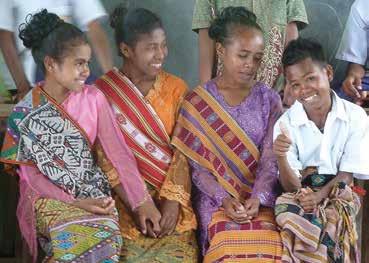
1. Pray that, as Christians, we will recognize God’s might in our everyday circumstances.
2. Pray that we will find peace in God’s justice and control over all things.
3. Thank the Lord for His mercy in promising ultimate restoration and a reward for faithfulness to His children.

DR. YENY AGILA, NATIONAL DIRECTOR OF LUKE SOCIETY ECUADOR
Cultural Context: Ecuador is the second smallest country in South America. It is a country rich in natural and cultural diversity, featuring snowy mountains, beaches, jungle, and our charming Galapagos Islands. The majority of the population, 84%, practices Catholicism and 11% practices Evangelical Christianity. The Good News has reached Ecuador for over 100 years, but sadly, the vast majority of people belong to churches with a more Pentecostal bias, focusing more on emotions rather than studying and examining the Scriptures.
“ Seek the Lord and His strength; seek His face evermore! (1 Chronicles 16:11).
How do you react when you are faced with discouragement and fear? I have the privilege of serving the Lord in the coastal city of Quininde. During the years that I have lived here, I have experienced many times of discouragement and fear, but I have also experienced God’s faithfulness in many ways. Most of the time when faced with challenging circumstances, we tend to become restless, worried, and even distressed. These are moments when the enemy seizes the opportunity to fill us with guilt and shame, attempting to fulfill his task of discouraging us. It doesn’t matter whether the struggles are personal, related to family relationships, or involve church issues—fear invades us. This is when we need to take our eyes off our present circumstances and focus on what Jesus achieved for us on the cross—all believers have been saved and will be delivered from the troubles of this world for eternity.
After experiencing the challenges of the pandemic, the city of Quininde was impacted by another major challenge: the infiltration of criminal gangs. These gangs fought to recruit teenagers in our city, some of whom were enrolled in our children’s programs. Discouragement came and we were filled with fear, especially when we saw that girls and teenagers were being kidnapped as hostages. We felt powerless, frustrated, and angry, but when we turned our gaze to Jesus, everything changed. Our struggles became small and we were filled with peace because we were, and have been, called to walk with our eyes fixed on the Author of our Faith, with the certainty that He will return to gather His people. In that moment, we will experience what it is to live a life without pain, tears, or suffering. And while we wait for that moment to arrive, we say with the prophet Habakkuk: “Though the fig tree may not blossom, nor fruit be on the vines; though the labor of the olive may fail, and the fields yield no food; though the flock may be cut off from the fold, and there be no herd in the stalls—yet I will rejoice in the Lord, I will joy in the God of my salvation” (Habakkuk
3:17–18). Whatever circumstances you find yourself in today, come and rejoice in our God with me. W&D
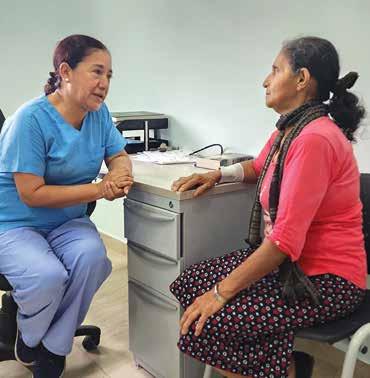
1. Pray that God will bring comfort to His people in times of fear and discouragement.
2. Pray for the protection of vulnerable youth in Ecuador, that they will be encouraged to seek the Lord and the strength He promises to provide.
3. Pray for faithful endurance and joy in the midst of trials—for the Christians in Quininde and all over the world.
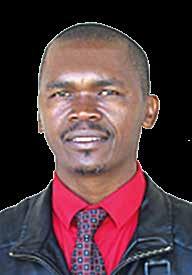
ISAAC MALEKE, DEAN OF STUDENTS AT MUKHANYO THEOLOGICAL COLLEGE
Cultural Context: South Africa, and Sub-Saharan Africa in general, embodies a pluralistic religious environment. Although many make faith claims in Christ, when one looks closer, you begin to see that their faith is not in Christ alone. Rather, it is a syncretistic form of religion that fuses traditional religious ideas with Christianity. Another form of syncretism that is growing fast is called the prosperity “gospel,” which really is a materialisticdriven cult with a little bit of gospel flavor. The other issue is a profession of faith without accompanying transformed lifestyles. This makes Christianity appear ineffective in transforming the lives and the communities of those who profess it.
Elijah came to all the people, and said, ‘How long will you falter between two opinions? If the LORD is God, follow Him; but if Baal, follow him’ (1 Kings 18:21).
In the text before us today, the prophet Elijah is challenging the false religion in Israel that so many had embraced. They had essentially replaced the worship of YAHWEH with a diluted form that included Baal. Those who insisted on the exclusive worship of the God of Israel were persecuted and killed. This was nothing but double-mindedness, as mentioned in the book of James: “If any of you lacks wisdom, let him ask of God, who gives to all liberally and without reproach, and it will be given to him. But let him ask in faith, with no doubting, for he who doubts is like a wave of the sea driven and tossed by the wind. For let not that man suppose that he will receive anything from the Lord; he is a double-minded man, unstable in all his ways” (James 1:5–8). The prophet Elijah is calling on them to make a clear choice. Is it going to be YAHWEH or Baal? It couldn’t be both, Elijah was clear on that.
This is the choice that confronts us also in the syncretistic societies that we live in today. In South Africa so many professing Christians are sitting on the fence, as it were, and the same can be said for many other Christians around the world. In South Africa, Christians will say that Jesus is Lord but ancestral spirits are supreme in their lives as well. Christ is not given the right place of authority to rule over every part of their lives. For the average person, faith is not accompanied by a genuine commitment to live out the faith claims in daily discipleship. Could this be the reason why we are not sufficiently “salt” and “light” as the Lord demands of us? “You are the salt of the earth; but if the salt loses its flavor, how shall it be seasoned? It is then good for nothing but to be thrown out and trampled underfoot by men. You are the light of the world. A city that is set on a hill cannot be hidden . . . Let your light so shine before men, that they may see your good works and glorify your Father in heaven”
(Matthew 5:13–16). We owe it to Christ to yield ourselves wholeheartedly and willingly to Him who has loved us so dearly and so freely. W&D

1. Pray that the church in Southern Africa will grow in pure doctrine and in holiness.
2. Pray that the worldwide church will truly, through word and deed, reflect the truths of the Gospel.
3. Pray that Christians will be bold and unashamed of testifying to the Gospel of the Lord Jesus Christ.
These are God’s people on the front lines reporting to us about their joys and sorrows. They face many more challenges than most of us do. What a privilege to walk beside them, prayerfully, thoughtfully, and by God’s grace, faithfully.
“
“God’s power is at work in us, but He also calls us to be active participants in His redemptive mission.”
– Pastor Carlos Figueroa, Colombia
“We are Gospel workers wherever God has placed us. May the Lord give us strength to live out this calling.”
– Juan Carlos Ramirez, Costa Rica
“Our struggles became small and we were filled with peace because we were, and have been, called to walk with our eyes fixed on the Author of our Faith, with the certainty that He will return to gather His people.”
– Dr. Yeny Agila, Ecuador

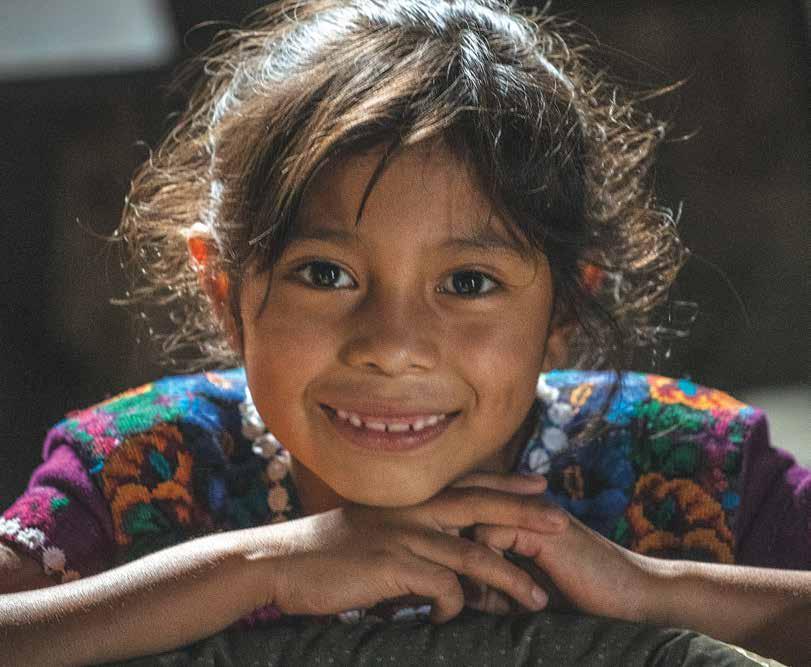
“The believer who has little but rests in Christ is richer than the one who has much but is consumed by worry.”
– Lucas Ferro, Guatemala
“As we meditate on God’s might, we recognize that He approaches us not as a distant deity but as an intimate, powerful God and as a loving Father.”
– Pastor Yonson Dethan, Indonesia
“Deception is exposed when it is confronted with the truth.”
– Carlos Coffin, Nicaragua
“We owe it to Christ to yield ourselves wholeheartedly and willingly to Him who has loved us so dearly and so freely.”
– Isaac Maleke, South Africa